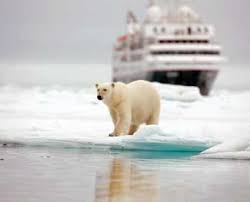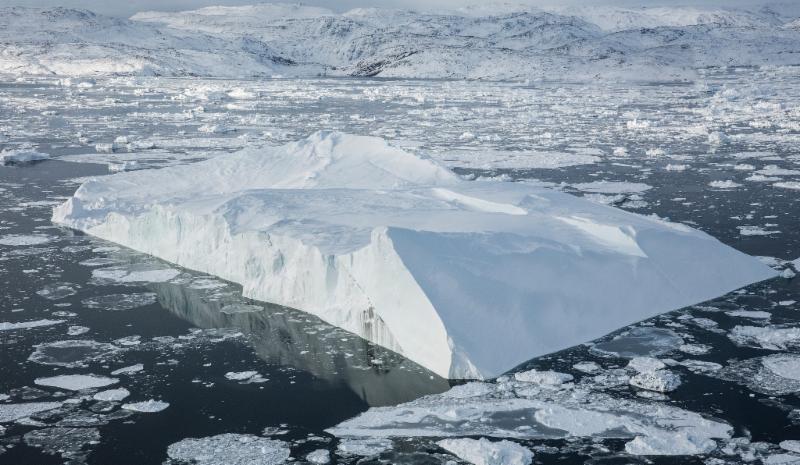|
|
|
|
|
|
|
|
Today's Congressional Action:
The House and Senate are not in session.
|
Media
 Uncharted Waters: Mega Cruise Ships Sail the Arctic. A surge in Arctic tourism is bringing ever bigger cruise ships to the formerly isolated, ice-bound region, prompting calls for a clamp-down to prevent Titanic-style accidents and the pollution of fragile eco-systems. Arctic nations should consider limiting the size of vessels and ban the use of heavy fuel oil in the region, industry players said, after a first luxury cruise ship sailed safely through Canada's Northwest Passage this summer. Alaska Dispatch News Uncharted Waters: Mega Cruise Ships Sail the Arctic. A surge in Arctic tourism is bringing ever bigger cruise ships to the formerly isolated, ice-bound region, prompting calls for a clamp-down to prevent Titanic-style accidents and the pollution of fragile eco-systems. Arctic nations should consider limiting the size of vessels and ban the use of heavy fuel oil in the region, industry players said, after a first luxury cruise ship sailed safely through Canada's Northwest Passage this summer. Alaska Dispatch News
Long-Awaited Quebec Legislation to Recognize Inuit Custom Adoptions. Nunavik leaders say they welcome long-awaited changes to Quebec legislation that will recognize the status of Inuit involved in traditional adoptions. Bill 113, tabled in Quebec's National Assembly Oct. 6, includes new provisions that will recognize Inuit custom adoption, to ensure the constitutional and treaty rights of adopted children and their parents are respected. Nunatsiaq Online
 Tracking the Amount of Sea Ice From Greenland Ice Sheet. The Greenland ice sheet records information about Arctic temperature and climate going back to more than 120 000 years ago. But new research from the Niels Bohr Institute among others reveals that the ice doesn't just tell us about the situation in the air and on the land - it can also tell us about what was happening at sea. By analysing ice cores drilled from deep inside the Greenland ice sheet, researchers have started to calculate how much Arctic sea ice there was in the past. The results have just published in the research journal Scientific Reports. Arctic sea ice is changing. In the past the Arctic Ocean was covered by metres of thick sea ice but now that sea ice is thinning and being replaced by sea ice that melts away over the summer. Environmental Research Web Tracking the Amount of Sea Ice From Greenland Ice Sheet. The Greenland ice sheet records information about Arctic temperature and climate going back to more than 120 000 years ago. But new research from the Niels Bohr Institute among others reveals that the ice doesn't just tell us about the situation in the air and on the land - it can also tell us about what was happening at sea. By analysing ice cores drilled from deep inside the Greenland ice sheet, researchers have started to calculate how much Arctic sea ice there was in the past. The results have just published in the research journal Scientific Reports. Arctic sea ice is changing. In the past the Arctic Ocean was covered by metres of thick sea ice but now that sea ice is thinning and being replaced by sea ice that melts away over the summer. Environmental Research Web
Spain Claims its Historical Rights to Fishing for Arctic Cod. Minister of Agriculture, Food and Environment, Isabel García Tejerina, participated yesterday in Luxembourg at the meeting of the Council of Fisheries Ministers of the European Union, which approved the draft regulation setting TACs (total allowable catches) and quotas in the Baltic Sea for 2017, established for the first time based on a Multi-Year Plan. The quotas approved for the Baltic Sea, based on the recently approved Multi-Year Plan, represent a major step towards regionalization, within the framework of the Common Fisheries Policy (CFP). FIS
Scientists Spend Arctic Winter Adrift on Sea Ice. Imagine spending the winter camping near the North Pole, drifting on a raft of sea ice-temperatures below −30°C, five months of almost total darkness, and roaring sounds of crushing ice nearby (but you don't know exactly where). On 30 August 2014, our two-man crew prepared to do just that. For the next 11.5 months, the sea ice and a hovercraft would be their home. Our goal was to obtain ocean sediments for studies of the Mesozoic and Cenozoic history of Arctic Ocean from 252 million years ago until the present time. EOS
|
Legislative Action.gif)
No Arctic legislation was formally considered yesterday.
|
|
Future Events
Arctic Technology Conference, October 24-26, 2016 (St. John's, Canada). Founded in 1969, the Offshore Technology Conference (OTC) is the world's foremost event for the development of offshore resources in the fields of drilling, exploration, production and environmental protection. The Arctic Technology Conference (ATC) is built upon OTC's successful multidisciplinary approach, with 14 technical societies and organizations working together to deliver the world's most comprehensive Arctic event.
Fulbright Arctic Week. October 25-27 (Washington, DC) The 18-month Fulbright Arctic Initiative supports U.S. priorities on Arctic issues and increasing mutual understanding between Americans and those in other countries. As a culmination of the program, 17 scholars will be presenting their work at public events. Other invited speakers will include officials from the Inuit Circumpolar Council, Arctic Executive Steering Committee, and U.S. Arctic Youth Ambassadors, among other. For more information, please visit the Fulbright Arctic Week website and/or register your interest for updates.
October 25, 2-5:30pm - Smithsonian Natural History Museum
October 26, 2-5pm - Arctic Policy Dialogue at the Carnegie Endowment for International Peace
October 27, 9am-4:30pm - Fulbright Arctic Symposium at the National Academy of Sciences (Constitution Ave. location)
ARCUS Arctic Research Seminar Series with George Divoky, October 26, 2016 (Washington, DC USA). The Arctic Research Consortium of the US (ARCUS) is pleased to announce the Arctic Research Seminar Series event "Years of Change: a seabird responds to a melting Arctic." The ARCUS Arctic Research Seminar Series brings some of the leading Arctic researchers to Washington, DC to share the latest findings and what they mean for decision-making. These seminars will be interest to Federal agency officials, Congressional staff, NGOs, associations, and the public.
Towing Safety Advisory Committee, October 2016 Meeting, October 26-27, 2016 (Washington, DC USA). The Towing Safety Advisory Committee will meet in Washington, DC, to review and discuss recommendations from its Subcommittees and to receive briefs. This committee is established in accordance with, and operates under the provisions of, the Federal Advisory Committee Act. As stated in 33 U.S.C. 1231a, the Towing Safety Advisory Committee provides advice and recommendations to the Department of Homeland Security on matters relating to shallow-draft inland and coastal waterway navigation and towing safety.
** New this week ** 1st International Muskox Health Ecology Symposium, November 7-10, 2016 (Calgary, AB Canada). The goal of this symposium is to share knowledge on muskox health ecology and sustainability across a variety of international stakeholders including community members/users, industry, wildlife management, and academia. We will discuss: the values, ecological, economic, social and cultural, of muskoxen; population status and trends; threats, vulnerabilities and resilience or sustainability; knowledge gaps; disease ecology; and existing and new tools for muskox health monitoring and research. For more information, please contact Susan Kutz.
Annual Scientific Meeting 2016, December 5-9, 2016 (Winnipeg, MP Canada). ArcticNet will host its 12th Annual Scientific Meeting. The ASM2016 will welcome researchers, students, Inuit, Northerners, policy makers and stakeholders to address the numerous environmental, social, economical and political challenges and opportunities that are emerging from climate change and modernization in the Arctic. As the largest annual Arctic research gathering held in Canada, ArcticNet's ASM is the ideal venue to showcase results from all fields of Arctic research, stimulate discussion and foster collaborations among those with a vested interest in the Arctic and its peoples.
POLAR 2018, June 15-27, 2018 (Davos, Switzerland). POLAR2018 is a joint event from the Scientific Committee on Antarctic Research (SCAR) and the International Arctic Science Committee (IASC). The SCAR meetings, the ASSW and the Open Science Conference will be hosted by the Swiss Federal Institute for Forest, Snow and Landscape Research WSL under the patronage of the Swiss Committee on Polar and High Altitude Research. The WSL Institute for Snow and Avalanche Research SLF is organizing POLAR2018.
|
|

  
4350 N. Fairfax Drive, Suite 510
Arlington, VA 22203, USA
External links in this publication, and on the USARC's World Wide Web site ( www.arctic.gov) do not constitute endorsement by the US Arctic Research Commission of external Web sites or the information, products or services contained therein. For other than authorized activities, the USARC does not exercise any editorial control over the information you may find at these locations. These links are provided consistent with the stated purpose of this newsletter and the USARC Web site.
|
|
|
|
|
|
|
|
|